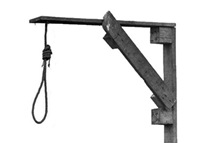death penalty
PTI reported that a Supreme Court bench headed by Justice AR Dave rejected the review of Yakub Abdul Razak Memon’s death penalty, after having stayed his execution on 2 June 2014 and upholding the sentence on 21 March 2013.
Memon had planted explosives in cars in Mumbai, with 10 of his accomplices having had their death sentences commuted to life terms.
After the Supreme Court had rejected all appeals against the convict in the Noida-based Nithari killings, Surinder Koli, the Allahabad high court commuted his death sentence in public interest litigation (PIL) of the People’s Union for Democratic Rights (PUDR).
Chief Justice DY Chandrachud and Justice PKS Baghel commuted his sentence to life in prison on the basis of the Uttar Pradesh governor’s three-and-a-half year delay in disposing his mercy petition and the “misapplication” of rules, reported The Hindu
Scroll.in lists nine, mostly compelling, reasons for why convicted serial murdered Surendra Koli should not be hanged, including a lack of evidence, his apparent psychopathy, iffy confession and oher circumstances. Worth a read, at Scroll.in.
Senior counsel Indira Jaising had obtained a stay on Koli’s execution in the early hours of Monday, 7 September morning, from Supreme Court Justice HL Dattu. The Supreme Court has now stayed his execution until the end of October.
The Supreme Court Friday extended its order putting on hold the execution of the death sentence of Nithari killer Surendra Koli till Oct 29.
While extending the stay, an apex court bench headed by Chief Justice-designate Justice H.L. Dattu asked the senior counsel to place before them in bullet points the grounds on which Koli is seeking a review of the judgement confirming his death sentence by the top court.
The court will hear Koli’s review petition Oct 28.
Late on Sunda night senior counsel Indira Jaising had obtained the first stay of execution that was scheduled for Monday, in order to hear an oral review of his judgment.
More background at The Hindu.
In a pre-dawn order at the residence of future CJI HL Dattu with Justice AR Dave, the Supreme Court has stayed the execution of Surinder Koli, who was convicted of the so-called Nithari serial murders and rapes that took place in Noida from 2005.
Senior counsel Indira Jaising obtained the one-week stay order hours before Koli was due to be hanged, in order to allow a fresh review petition against the sentence to be heard in an open court, reported The Hindu, in line with an earlier constitution bench judgment that it is mandatory to allow oral hearings in death penalty review cases.
Jaising told The Hindu: “We approached Justice Dattu at 1.30 am. There was a sitting of a Bench of Justices Dattu and Dave, which ordered that the execution be stayed for a period of a week until Koli’s fresh review be heard by a Bench comprising three judges of the Supreme Court in an open courtroom, where his counsel will be allowed to submit limited oral arguments on his behalf pleading for reversal of his reversal of death penalty.”
The new Chief Justice of India RM Lodha and a bench of two others stayed the death penalty of 2000 Red Fort shootout convict because he had already served 14 years [Times of India]
A Supreme Court bench headed by Chief Justice of India (CJI) P Sathasivam, who retires tomorrow to make way for Justice RM Lodha as CJI, said that a constitution bench will look into whether the commuted death sentence of the seven conspiring assassins of former prime minister Rajiv Gandhi, should mean they will continue to be imprisoned for life or released by the Tamil Nadu government. [TOI] [Download judgment]
Journalist @spread_law tweeted: "Matter referred to Constitution Bench of not less than 5 judges. The Constitution bench to decide what is the extent of state's power when it comes to remission of a person who is convicted under a central law. And whether court can cut down the power of state Government to remit sentence by way of a judicial order."
@sankararaman tweeted that it was a "clear example of chickening out. No judge wants to be remembered as the one who ordered release of ex-PM's assassins".
@suhrith wrote that "a reference to a constitutional bench is fine if there is a substantial question to be decided. Not sure there is one here" and @CourtWitness1 added: "What stupidity is this from the Supreme Court? How is a writ petition by the Central Govt even maintainable?!!"
 Lawyer Nandita Saikia discusses how the recent criminal law recent reforms, imposing the death penalty for rape, are a symptom of the problem but not a solution.
Lawyer Nandita Saikia discusses how the recent criminal law recent reforms, imposing the death penalty for rape, are a symptom of the problem but not a solution.
A Supreme Court bench of CJI P Sathasivam, and Justices RM Lodha, HL Dattu and Sudhansu Jyoti Mukhopadhaya, commuted the death penalty of 1993 Delhi bomb blast convict Devender Pal Singh Bhullar to life imprisonment, citing its earlier Shatrughan Chauhan decision.
 A Supreme Court bench headed by Chief Justice of India (CJI) P Sathasivam today commuted the punishment for Rajiv Gandhi assassins Murugan, Santhan and Arivu from death penalty to life imprisonment on ground of “inordinate delay”, 15 years after the first ever mercy petitions were filed in the case.
A Supreme Court bench headed by Chief Justice of India (CJI) P Sathasivam today commuted the punishment for Rajiv Gandhi assassins Murugan, Santhan and Arivu from death penalty to life imprisonment on ground of “inordinate delay”, 15 years after the first ever mercy petitions were filed in the case.
Chief Justice of India (CJI) P Sathasivam and Justices Ranjan Gogoi and Shiva Kirti Singh argued that the right to seek mercy is a constitutional right not at the “discretion or whims of the executive”.
Supreme Court judges P Sathasivam and JS Khehar yesterday justified awarding the death penalty to the murderer of a seven-year-old boy, on the ground of his gender among other “aggravating circumstances”. Killing the sole male child of a family meant the lineage could not be carried forward, reported the Times of India.
The bench said:
The parents of the deceased had four children — three daughters and one son. Kidnapping the only male child was to induce maximum fear in the mind of his parents. Purposefully killing the sole male child has grave repercussions for the parents of the deceased…
Agony for parents for the loss of their male child, who would have carried further the family lineage, and is expected to see them through their old age, is unfathomable. Extreme misery caused to the aggrieved party certainly adds to the aggravating circumstances.
The accused lured the victim, whom he knew, away after school under some pretext, kidnapped him and called his house for ransom. After a delay in being provided the money he strangled the boy stuffed him in a gunny bag and dumped him in a water tank.
The Supreme Court reaffirmed the death sentence upheld by the Bombay High Court in February 2011 against Ajmal Amir Kasab, one of the gunmen in the 26/11 Mumbai terrorism attack that killed 166.
The bench of justices Aftab Alam and CK Prasasd said: “Ajmal Kasab's act is very much an act of waging a war against India. We are left with no option but to uphold the death sentence of Kasab.” Senior advocate Raju Ramachandran argued as amicus curiae on behalf of Kasab, contending that he was not given a fair trial, was not part of a larger conspiracy of waging war against India that the prosecution failed to prove their case beyond doubt, and that his right to self-incrimination and adequate representation had been violated at trial. [Firstpost / IBNLive]
Before the death sentence will be carried out, Kasab now has the option of filing a mercy petition before the President of India, who would first have to dispose of 20 other mercy petitions with one dating back to 2001, before dealing with Kasab’s [Rediff]
A group of ministers (GoM) on aviation security has recommended that hijackers should get the death penalty.
"The clause on death penalty to the hijackers had been a debating point as some ministers had a view on the legal aspects of this section. But it has been cleared," a civil aviation ministry official told Indo Asian News Service.
A report by human rights NGO Amnesty International on the death penalty in India estimates that at least 140 persons were sentenced to death between 2006 and 2007. Around 44 were sitting on Indian death row around 2007 according to Amnesty, although the Government does not release official figures.
The death penalty is carried out by hanging in India.
Amnesty criticised the quality of legal representation available in capital cases, as well as concerns about the safeguards to ensure fair trial in terrorism cases.
While national and aviation security is important, is it a good idea that another offence is added to the capital offences list?
As lawyers, what do you make of the death penalty in India? Do you think it is necessary to keep the peace or is it a violation of fundamental human rights?